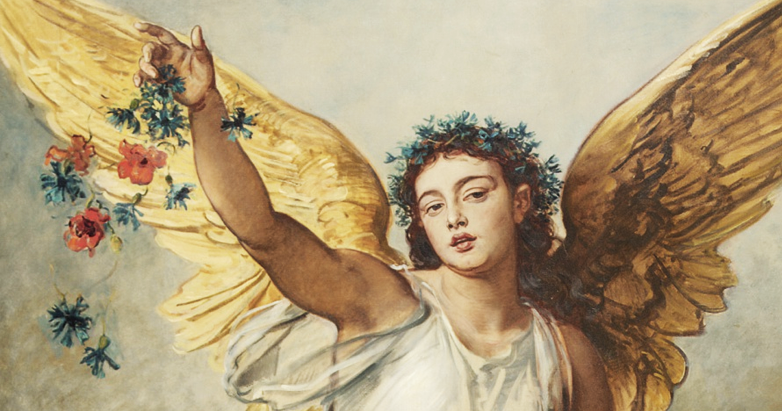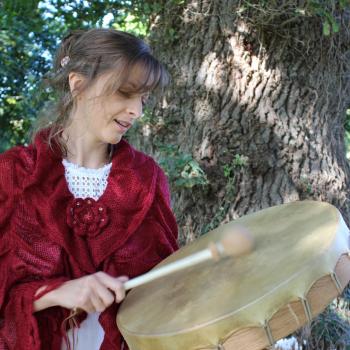On May 6th 2018 I took part in an interfaith service on the theme of ‘peace’ at Chatham Unitarian Church. I was invited to hold a short Pagan blessing for peace, and a speech about peace from the secularist perspective. Here are them both!
Speech: A Secularist Perspective On Peace

I would consider myself a reasonably devout and passionate Pagan. I run a Pagan group in Gravesend where I often lead rituals, I write a column about Paganism on a large religious blogging website, and I pray – or, at least aim to pray – every day at my shrine at home.
But I am also a devout and passionate secularist. So I am very grateful to Chatham Unitarian Church for inviting me to talk a little bit about secularism, and what working towards peace means for secularism.
Firstly, I would like to explain a little about what secularism is. It is very important to say that secularism is not the same as atheism or humanism, although many atheists and humanists are also secularists. One key difference is that atheism and humanism are philosophical worldviews, while secularism is more of a political idea. Secularism has nothing to with belief, or disbelief, in God. It is about how religion interacts with society, politics and law.
You may already know that secularists believe that the state should be separate from the church – in other words, that government and politics should keep a respectful distance from one another. But there is much more to secularism than that.
Secularism is really based on a very simple principle, one that I think everyone here can agree with. That is, all people, of all religions and no religion, are equal, and that all people are entitled to the same basic human rights.
From this simple principle, everything else follows. Secularists believe that nobody should be disadvantaged or privileged because of their religion, or for having no religion. Moreover, nobody has the right to impose their beliefs on others.
That’s why secularists believe that state and church should be separate. When the state supports a religion, it gives that religion special status over other beliefs, meaning that people of different religions or no religion are disadvantaged. A 2017 study by the Pew Research Center found that countries with a state religion or a religion preferred by the state are more likely to restrict religious freedom than those without a state religion. Secularists are also opposed to states that are hostile to all religions, such as China where members of religious groups not explicitly sanctioned by the government are routinely persecuted.
Furthermore, secularists believe that our laws should be made democratically by parliament, rather than determined by the interpretation of religious scripture by priests or scholars. And nobody should be exempt from laws, or persecuted by laws, because of their religion or because they have no religious beliefs.
Peace is one of the main purposes that secularism serves. In a society where people of all beliefs and none are equal, it is much easier for us to get along. Equality breaks down the barriers between us, allowing us to live in cohesive communities together, rather than being segregated according to religion. Where there are no barriers between us, suspicion, bigotry and hatred are far less likely to fester.
Secularism also helps to eliminate conflicts that arise as a result of religion. Sadly, as we all know, religion is a contributing factor in a huge number of conflicts throughout the world. This is usually because one religious group believes itself to be the “true” path and wants to dominate over all other groups. And very often, it will try to dominate through violent means. Such extremists do not care about democracy, human rights, religious freedom or the dignity of the individual. All they care about is enforcing their extremely narrow worldview and religious codes upon others.
I believe that promoting secular, liberal, values like equality, tolerance, freedom of expression and democracy is key in achieving peace between our nations, and the many diverse groups within our own nation. Britain is now more religiously-diverse than it has ever been before, and this diversity will probably continue to grow. To ensure peace, harmony and understanding between these many different groups, we need an approach that puts pluralism and personal liberty at its core. I believe secularism offers this approach. That’s why I will continue to campaign for greater fairness, freedom and equality for people of all religions and none, both in the UK and across the world.
Blessing: A Pagan Call To Peace

All stand and face East
Leader: May there be peace in the East!
All: May there be peace in the East!
All turn to face South
Leader: May there be peace in the South!
All: May there be peace in the South!
Face West
Leader: May there be peace in the West!
All: May there be peace in the West!
Face North
Leader: May there be peace in the North!
All: May there be peace in the North!
Face inward towards central altar
Leader: May there be peace throughout the whole world!
All: May there be peace throughout the whole world!
Leader: May there be peace within ourselves!
All: May there be peace within ourselves!
[Everyone may seated again]
Leader: I call upon the Great Goddess, in her many incarnations:
Philophrosyne, Goddess of Friendship and Kindness
Eurphrosyne, Goddess of Happiness
Eleos and Clementia, Goddesses of Compassion
Harmonia and Concordia, Goddesses of Harmony
Aequitas, Goddess of Equality
Homonia, Goddess of Unity
Eirene and Pax, Goddesses of Peace
Be with us here as we pray for peace.
We pray for the light of peace within our own hearts and minds. May we see the world with compassion, patience, understanding and tolerance.
May that light of peace within spread outwards, touching everyone gathered here in Chatham Unitarian Church.
May that light of peace spread further, touching all of Chatham, spreading out through all of Medway, all of Kent, all of England, all of these British Isles.
And may that light of peace spread across the seas to all the countries in the world, bringing hope and love to even the darkest corners of places ravaged by war and terror.
And help us all, in our daily lives, to do what we can practically to bring peace to everyone – to our families, our friends, our work colleagues, strangers and to the wider world.
So Mote It Be!
If you believe in equality for people of all religions and none, please consider joining the Pagans for Secularism Facebook group!













